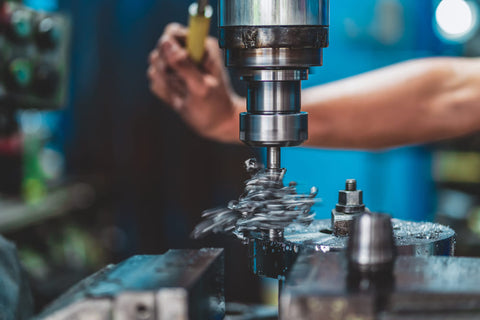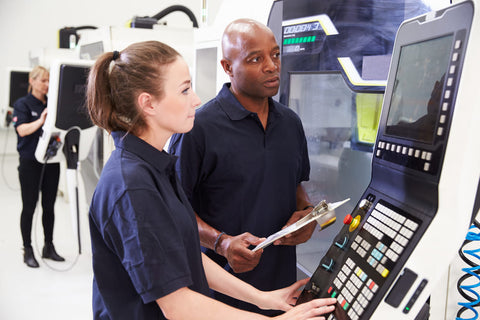If you have a knack for understanding technical instructions and are interested in operating heavy equipment, a career as a machinist could be right for you. Whether you have already been searching for a training program or just heard of this role for the first time, keep reading to learn what a machinist does and find out what skills you need to succeed.
|
Table of Contents |
What Does a Machinist Do?
Machinists use various tools to measure, cut, and modify objects that meet precise specifications. Because of this, machinists must be able to analyze technical blueprints and understand the basics of mechanics, mathematics, metallic properties, and machining.
Here are some common tools found in a machinist’s workshop:
- Mills
- Lathes
- Drills
- Lasers
- Grinders

Types of Machinist Jobs
No two machinist jobs are the same. You can specialize in a particular area, including:
- Fitter
- Grinder
- Turning hand
- Mill hand
- Mold maker
- Tool and die maker
- Pattern maker
- Programmer
- Operator
Job Responsibilities
These are the day-to-day tasks of a machinist:
- Set up, operate, and maintain precision equipment
- Mill, turn, drill, shape, and grind machine parts to their exact specifications
- Repair parts
- Create new parts
- Collaborate with engineers and coworkers
- Understand the properties of different metals
- Inspect and test finished products
- Program mills, drills, and lathes
- Follow safety regulations
- Maintain production and quality logs
- Plan stock inventory

How To Become a Machinist
Becoming a licensed machinist involves three key steps:
- Degree(s): Most machinist jobs only require a high school diploma or GED. You can pursue an associate’s degree if you want, but it’s not required. You’ll also need to obtain your certification by completing some type of training program.
- Training: On-the-job training is the most valuable asset for a machinist seeking employment. You can gain hands-on experience through a training course at a local trade or vocational school or through an apprenticeship program.
- Apprenticeship: Apprenticeships are sponsored by unions and manufacturers and can last up to four years. These paid positions instruct apprentices in the following areas:
- Math
- Physics
- Materials science
- Mechanical drawing
- Blueprint reading
- Quality practices
- Safety practices
- CNC machine tool operation
- CNC machine tool programming
Whether you train at a local trade or vocational school or through an apprenticeship program, you should familiarize yourself with machinist tools and power supply equipment like phase converters.

Machinist FAQ
What Is a CNC Machinist?
A CNC machinist is a skilled tradesperson who uses various tools and heavy equipment to cut and shape objects for various industries. CNC (computerized numerical control) machines feature automated movements. After reviewing blueprints, the machinist inputs precise instructions and controls machines as they carry them out to create the desired object.
Are Machinists in High Demand?
Employers across industries always need skilled machinists who have on-the-job experience. The Bureau of Labor Statistics expects 38,200 new jobs to become available annually from 2022 to 2032. Although mass production is a growing trend, machinists are still needed to create custom parts.
What Is a Machinist's Salary?
The median annual wage for machinists in May 2022 was $48,510, with the top ten percent earning over $71,820.
How Do I Find a Machinist Apprenticeship?
Contact a local union or manufacturer to ask about available apprenticeship opportunities.
Power Every Project With Phoenix Phase Converters
Whether your position involves operating drills, lathes, or mills, you probably use a phase converter to get the job done. Phase converters transform unreliable single-phase power supplied by your utility provider into reliable three-phase power that can be used for any application.
Phoenix Phase Converters is home to the highest-quality rotary and digital phase converters on the market. We’ll even customize your device to meet your exact specifications. Don’t waste valuable time and money trying to get by with single-phase electricity; power your next project with a top-rated phase converter.
